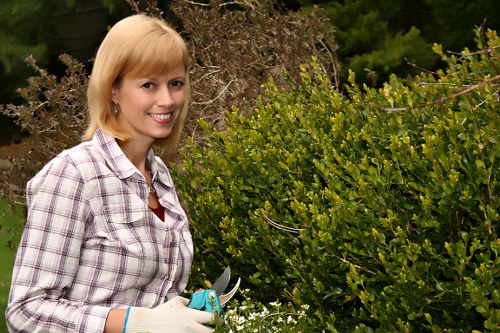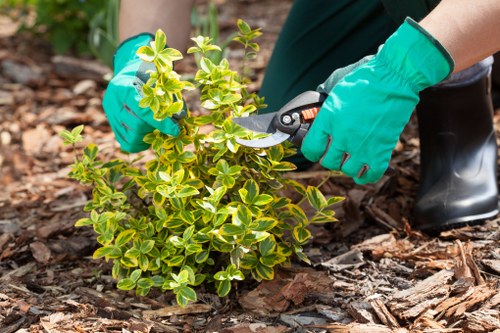Garden Maintenance in Kings Cross
Introduction to Garden Maintenance in Kings Cross

Maintaining a beautiful garden in Kings Cross requires careful planning and consistent care. Whether you are a seasoned gardener or a beginner, understanding the unique climate and soil conditions of Kings Cross is essential for creating a thriving outdoor space.
From selecting the right plants to regular upkeep, garden maintenance encompasses a range of tasks that ensure your garden remains vibrant and healthy throughout the year.
In this article, we will explore the key aspects of garden maintenance specific to the Kings Cross area, providing you with practical tips and insights to enhance your garden’s beauty and functionality.
Understanding Kings Cross Climate and Soil

The climate in Kings Cross is characterized by mild winters and warm summers, with moderate rainfall distributed throughout the year. This climate is conducive to a wide variety of plants, but it also presents specific challenges that gardeners must address.
The soil in Kings Cross tends to be a mix of clay and loam, which can affect drainage and nutrient availability. Conducting a soil test is a crucial step in garden maintenance, as it helps determine the necessary amendments to optimize plant growth.
Proper soil preparation, including the addition of compost and organic matter, can significantly improve soil structure and fertility, ensuring your garden thrives regardless of the season.
Choosing the Right Plants for Your Garden

Selecting plants that are well-suited to the Kings Cross environment is the foundation of successful garden maintenance. Native plants typically require less water and are more resistant to local pests and diseases.
Consider incorporating a mix of evergreen and deciduous plants to maintain year-round interest and structure in your garden. Additionally, flowering plants add color and attract pollinators, enhancing the ecological value of your outdoor space.
Some popular plant choices for Kings Cross gardens include lavender, hydrangeas, and seasonal bulbs like tulips and daffodils, which offer vibrant displays during their blooming periods.
Regular Pruning and Trimming

Pruning is an essential garden maintenance task that promotes healthy plant growth and maintains the desired shape and size of your plants. Regular trimming helps prevent disease by removing dead or diseased branches, thereby improving air circulation within the plant canopy.
For shrubs and hedges, annual pruning sessions in late winter or early spring are recommended. Flowering plants may require more frequent pruning to encourage multiple blooms and to remove spent flowers.
Proper pruning techniques vary depending on the plant species, so it’s important to research or consult with a gardening expert to ensure you're maintaining your plants correctly.
Weeding and Mulching Strategies

Weeding is a perennial challenge in garden maintenance, as unwanted plants can quickly take over and compete with your desired plants for resources. Regular weeding, especially during the growing season, is crucial to keep your garden under control.
Incorporating mulching into your garden maintenance routine offers several benefits. Mulch helps suppress weed growth, retains soil moisture, and regulates soil temperature, creating a more favorable environment for your plants.
Organic mulches, such as wood chips or shredded bark, also contribute to soil health as they decompose, adding nutrients and improving soil structure over time.
Effective Watering Practices
Proper watering is fundamental to maintaining a healthy garden in Kings Cross. The amount and frequency of watering depend on factors such as plant type, soil conditions, and weather patterns.
Implementing an efficient irrigation system, such as drip irrigation or soaker hoses, can help deliver water directly to the plant roots, minimizing evaporation and water waste. Early morning watering is ideal to reduce the risk of fungal diseases and ensure plants have ample moisture throughout the day.
Additionally, monitoring soil moisture levels and adjusting your watering schedule based on seasonal changes can optimize water usage and promote robust plant growth.
Fertilizing Your Garden
Fertilization provides essential nutrients that support plant growth and productivity. A balanced fertilizer containing nitrogen, phosphorus, and potassium is suitable for most garden plants. However, specific plant types may have unique nutritional requirements.
Organic fertilizers, such as compost, manure, or bone meal, are excellent choices as they improve soil health and provide a slow-release source of nutrients. Synthetic fertilizers can also be effective but should be used sparingly to prevent nutrient runoff and soil imbalances.
Applying fertilizer during the plant’s active growth phase, typically in spring and summer, ensures that plants receive the necessary nutrients when they need them most.
Pest and Disease Management
Protecting your garden from pests and diseases is a critical component of garden maintenance. Regular inspections help identify issues early, allowing for timely interventions that prevent extensive damage.
Implement integrated pest management (IPM) strategies, which combine biological, cultural, and chemical controls to manage pest populations sustainably. Encouraging beneficial insects, such as ladybugs and bees, can naturally reduce pest numbers without relying heavily on pesticides.
Maintaining garden hygiene by removing fallen leaves and debris also minimizes breeding grounds for pests and disease-causing organisms, contributing to a healthier garden environment.
Seasonal Garden Care Tips
Adapting your garden maintenance routine to the changing seasons ensures year-round health and beauty. In spring, focus on planting new perennials, pruning shrubs, and preparing flower beds for the growing season.
Summer maintenance involves regular watering, mulching, and controlling pests, while autumn tasks include clearing fallen leaves, planting bulbs for spring bloom, and preparing plants for colder weather.
In winter, protect sensitive plants from frost, mulch perennials to insulate roots, and plan for the upcoming gardening season by reviewing what worked well and what needs improvement.
Garden Maintenance Tools and Equipment
Having the right tools is essential for efficient garden maintenance. Basic tools include a quality set of pruners, a sturdy shovel, a rake, a hoe, and a watering can or hose.
Investing in durable and ergonomic tools can make maintenance tasks easier and more enjoyable. Additionally, specialized equipment like a wheelbarrow, garden fork, and power tools for larger tasks can enhance your garden care capabilities.
Regularly maintaining and cleaning your tools extends their lifespan and ensures they remain effective, allowing you to work more efficiently and prevent the spread of diseases between plants.
Hiring Professional Garden Maintenance Services
While many garden maintenance tasks can be managed by homeowners, certain aspects may benefit from professional expertise. Hiring a professional garden maintenance service in Kings Cross can save time and ensure your garden receives the care it needs.
Professional gardeners offer a range of services, including lawn care, pruning, pest control, and landscape design. Their expertise can help address specific challenges related to the local environment, optimizing plant health and garden aesthetics.
Additionally, professional services can provide seasonal maintenance packages, ensuring your garden remains well-maintained throughout the year with minimal effort on your part.
Benefits of Regular Garden Maintenance
Consistent garden maintenance offers numerous benefits, including enhanced curb appeal, increased property value, and a more enjoyable outdoor space for relaxation and entertainment.
Healthy gardens attract beneficial wildlife, such as birds and pollinators, contributing to a balanced ecosystem. Additionally, well-maintained gardens can improve air quality and provide a serene environment that promotes mental well-being.
By investing time and effort into regular garden maintenance, you ensure that your outdoor space remains a source of pride and pleasure for years to come.
Eco-Friendly Garden Maintenance Practices
Adopting eco-friendly practices in your garden maintenance routine helps protect the environment and promotes sustainability. Incorporate the following strategies to minimize your garden’s ecological footprint:
- Composting: Recycle garden waste and kitchen scraps into nutrient-rich compost, reducing landfill waste and enhancing soil fertility.
- Water Conservation: Implement rainwater harvesting systems and use drought-resistant plants to reduce water usage.
- Natural Pest Control: Utilize organic pesticides and encourage beneficial insects to manage pest populations naturally.
By embracing these eco-friendly practices, you contribute to a healthier environment while maintaining a beautiful and functional garden.
Creating a Sustainable Garden
A sustainable garden balances beauty, productivity, and environmental responsibility. Incorporate native plants, which are adapted to the local climate and require fewer resources, into your garden design.
Implementing permaculture principles, such as companion planting and crop rotation, can enhance biodiversity and soil health, promoting a resilient garden ecosystem.
Using renewable resources, like solar-powered garden lights and recycled materials for garden structures, further supports sustainability initiatives, making your garden both attractive and environmentally friendly.
Innovative Garden Maintenance Techniques
Staying updated with the latest garden maintenance techniques can improve efficiency and achieve better results. Techniques such as vertical gardening maximize space, especially in urban areas like Kings Cross, where space may be limited.
Hydroponics and aquaponics offer alternative methods for growing plants without traditional soil, providing precise control over nutrient delivery and reducing water usage.
Integrating smart technology, such as automated irrigation systems and garden monitoring sensors, can streamline maintenance tasks and ensure optimal growing conditions with minimal manual intervention.
Leveraging Technology for Garden Maintenance
Modern technology offers innovative solutions to simplify garden maintenance. Automated systems can manage watering schedules, monitor soil moisture levels, and control lighting, ensuring your garden receives the care it needs even when you’re not available.
Smart garden apps provide valuable insights and reminders for maintenance tasks, helping you stay organized and proactive in your garden care routine.
Utilizing these technological advancements can enhance the efficiency and effectiveness of your garden maintenance efforts, leading to a healthier and more beautiful garden.
Conclusion: Achieving a Thriving Garden in Kings Cross
Effective garden maintenance in Kings Cross involves a combination of proper planning, regular care, and the adoption of sustainable practices. By understanding the local climate and soil conditions, selecting appropriate plants, and implementing consistent maintenance routines, you can create and sustain a vibrant garden.
Whether you choose to undertake garden maintenance yourself or enlist the help of professional services, the key to success lies in dedication and informed decision-making. Embrace the joy of gardening and transform your outdoor space into a beautiful and thriving haven.
Contact us today to learn more about our comprehensive garden maintenance services in Kings Cross and let us help you achieve the garden of your dreams.

